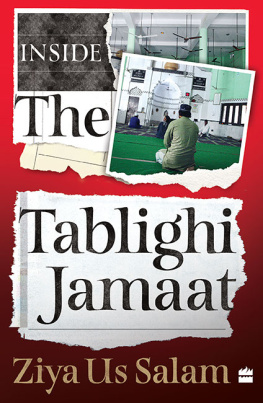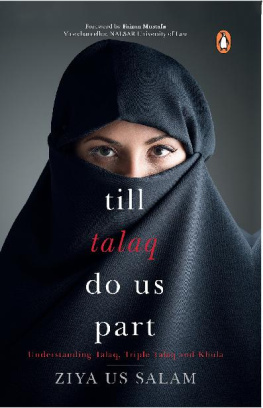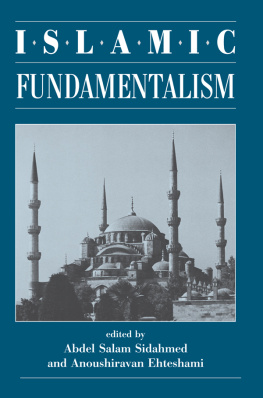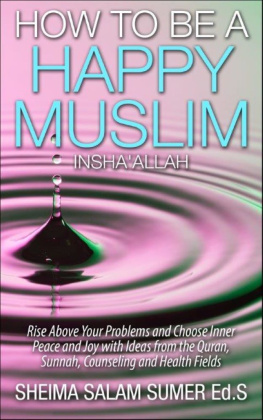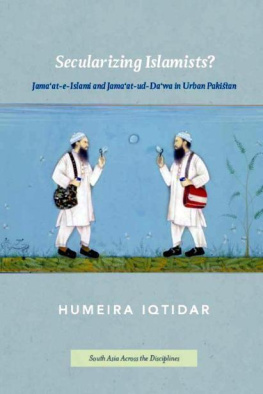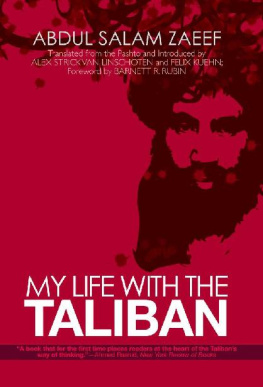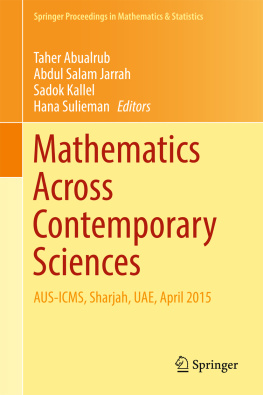Ziya Us Salam - Inside the Tablighi Jamaat
Here you can read online Ziya Us Salam - Inside the Tablighi Jamaat full text of the book (entire story) in english for free. Download pdf and epub, get meaning, cover and reviews about this ebook. year: 2020, publisher: HarperCollins, genre: Religion. Description of the work, (preface) as well as reviews are available. Best literature library LitArk.com created for fans of good reading and offers a wide selection of genres:
Romance novel
Science fiction
Adventure
Detective
Science
History
Home and family
Prose
Art
Politics
Computer
Non-fiction
Religion
Business
Children
Humor
Choose a favorite category and find really read worthwhile books. Enjoy immersion in the world of imagination, feel the emotions of the characters or learn something new for yourself, make an fascinating discovery.
- Book:Inside the Tablighi Jamaat
- Author:
- Publisher:HarperCollins
- Genre:
- Year:2020
- Rating:3 / 5
- Favourites:Add to favourites
- Your mark:
- 60
- 1
- 2
- 3
- 4
- 5
Inside the Tablighi Jamaat: summary, description and annotation
We offer to read an annotation, description, summary or preface (depends on what the author of the book "Inside the Tablighi Jamaat" wrote himself). If you haven't found the necessary information about the book — write in the comments, we will try to find it.
Inside the Tablighi Jamaat — read online for free the complete book (whole text) full work
Below is the text of the book, divided by pages. System saving the place of the last page read, allows you to conveniently read the book "Inside the Tablighi Jamaat" online for free, without having to search again every time where you left off. Put a bookmark, and you can go to the page where you finished reading at any time.
Font size:
Interval:
Bookmark:
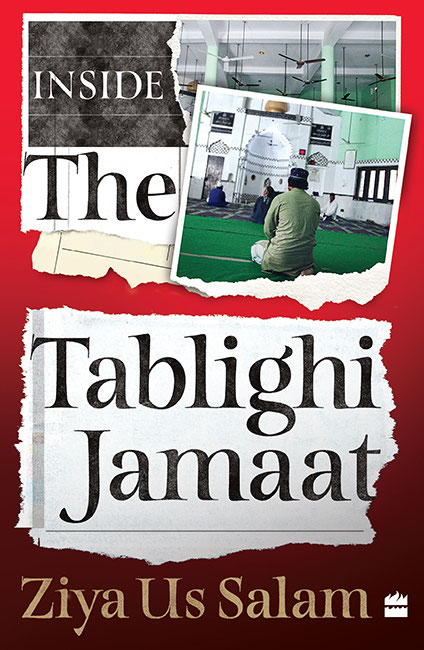

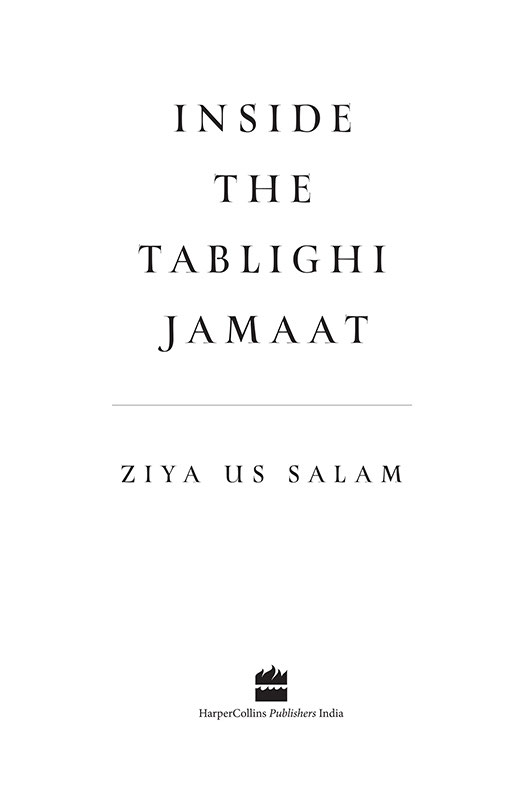
For
Eldy
(my late brother Dr Najmus Salam)
who regarded Islam not as a set of rituals, but a way of life
During the Emergency, former Prime Minister Indira Gandhi came down heavily on the Jamaat-e-Islami Hind and the Jamiat Ulama-i-Hind both Islamist organizations that paid for taking a stand against the authoritarian politics prevalent at the time.
Unlike the Jamiat which had actively participated in Indias struggle for independence, and had many freedom fighters as part of its distinguished history, who played a crucial role in the Non-Cooperation, Civil Disobedience and Quit India movements, the Jamaat, founded by Maulana Abul Ala Maududi in 1941, focused on the restoration of the Caliphate in its initial years. By the mid-1950s though, it was part of the Indian economy and polity, opening its bank account, participating in elections and seeking to enter various representative bodies. Both the Jamaat and the Jamiat brought out a newspaper each, Daawat and Al-Jamiat, respectively. The four-page broadsheets in Urdu focused on politics, economy, religion, and so on. In addition, the Jamaat published Radiance, an English magazine that adhered to its principles in letter and spirit. The publications of both organizations spoke of a commitment to Indias Constitution and voiced the interests of Indias largest minority through peaceful means. Indira Gandhi was neither pleased nor convinced, though, seeing in them as in others, a danger to her autocratic ways. They were dealt with swiftly, harshly, vengefully.
Several of the Jamaats functionaries were incarcerated. Journalists working for its newspapers and magazines were also imprisoned; some went underground, their offices were sealed, and their wives reduced to the status of half-widows. There were instances of senior officer-bearers of the Jamiat being picked up by the police in civilian clothes from their rooms in Deoband and sent away to jails in Lucknow, Kanpur and Bareilly. Often there was no confirmation of their incarceration for days.
One Muslim organization, however, was left untouched by the prime ministers muzzling tactics. It remained free to pursue its aim to profess, practise and propagate religion. At a time when members of many Muslim organizations went underground, its volunteers sporting long beards that touched their chests, and wearing pyjamas that ended a few inches above the ankles still went door to door, inviting the faithful to join daily prayers in the neighbourhood masjid. Their gashts (local tours) went on uninterrupted. Some men went for a three-day spiritual rehab, others for a forty-day chilla (a self-transformative tour to a mosque in another city). They would be called Allah Mian ki fauj (Allahs army) in jest. In contrast to rest of the country, they seemed to be living in a social and political vacuum: no power could touch them, no force could go near them. They were the members of the Tablighi Jamaat, a non-political body that was neither in favour of, nor against, the Congress or the Emergency.
The Tablighi Jamaat maintained no list of its members. It did not raise its voice for the release of political prisoners, including those of the Jamaat and the Jamiat. Neither did they step out to establish the Caliphate nor attempt to change the economic system governed by riba (interest), considered haraam (taboo) in Islam. Unlike the other two organizations, whose members were often well-heeled scholars of Islam, the Tablighi Jamaats members were poor, often illiterate men, who could barely recite a few verses from the Quran. They were told by their organization to look within to move ahead in life. They had no quarrel with the world. For them, life was all about internal cleansing with regular prayer, paving the path to spiritual upliftment. They memorized the Quran but made no effort to understand it; they sought no answers from the book. Instead they read Fazail-e-Amal (Virtues of Deeds), a compilation of Hadiths, some regarded as authentic by scholars of Islam, and others whose authenticity is questioned by most, besides some anecdotes and hearsay. From the poverty-stricken peasants of Bihar to dairy farmers of Mewat, all attended the Tablighs three-day retreats at local mosques. Some travelled all the way to the bodys Markaz (headquarters) in Nizamuddin, Delhi. They came of their own free will, at their own expense. They bought their own tickets, their own meals.
When Indira Gandhi asked for more information about the Tablighi Jamaat, her officials assured her that she had nothing to fear from it. She, however, was not convinced and sent members of her coterie to spend time at the Tablighs headquarters at Nizamuddin. For days, they searched for some evidence of propaganda against Mrs Gandhi a Friday sermon with political intonations or an address from the pulpit after Fajr (dawn) prayers. They were flummoxed. Forget Mrs Gandhi, the Tablighs members never spoke of any worldly affairs at all. There was no talk of increasing the representation of Muslims in government services or in Parliament, no talk of promoting Urdu or seeking more grants for Aligarh Muslim University. It was unlike other Muslim bodies, which sought to maintain balance between the here and the akhirah, the Hereafter, between worldly attainment and good deeds for the afterlife. The Tablighis cared, as the prime minister was informed and as most scholars of Islam would dub their spiritual quest to be, about matters beyond the sky and under the earth. Whatever happened in between did not concern them. The Tablighi Jamaat represents an ideal Muslim body for some focused on introspection and isolation.
It is this steadfast refusal to take a political stand or even guide the community in matters of religion that has stood the Tablighi Jamaat in good stead. Not just Indira Gandhi, but even the Janta Party, a ragtag combination of Opposition parties which replaced her at the Centre in 1977, and following governments, have had no impact on the Tablighi Jamaat. Nor has the organization ever been inconvenienced because of the countrys changing politics.
When the Muslim community was stirred into action during the Shah Bano debate in 1985, the Tabligh expressed no views either in favour or against the Supreme Court judgement or subsequent changes to the law made by Parliament. When popular Bharatiya Janata Party (BJP) leader L.K. Advani led a rath yatra from Somnath to Ayodhya in 1990, which impacted thousands of Muslim lives and livelihoods, the Tabligh remained silent. When a large section of the Muslim community raised their voice in favour of the Babri Masjid and organized rallies across north India, the Tabligh maintained its distance. Neither matters of Muslim personal law nor masjid shook them, not even the demolition of the Babri Masjid in 1992. The large-scale anti-Muslim riots in Gujarat in 2002 failed to goad the body into action. Even when Prime Minister Atal Bihari Vajpayee reminded Gujarat Chief Minister Narendra Modi of his Raj Dharma, the Tabligh did not express any opinion. Nor did it provide relief to those whose houses had been set ablaze, or those who had been orphaned and left destitute, effectively leaving the supplicants to their own means. The 2013 Muzaffarnagar riots, which the BBC described as the worst in a decade in India in which tens of thousands fled their homes, passed by without comment from the Tabligh, as did incidents of Muslim men being lynched following allegations of cow slaughter. Between May 2015 and December 2018, at least 44 people 36 of them Muslims were killed across 12 Indian states. Over that same period, around 280 people were injured in over 100 different incidents across 20 states, Human Rights Watch reported.
Font size:
Interval:
Bookmark:
Similar books «Inside the Tablighi Jamaat»
Look at similar books to Inside the Tablighi Jamaat. We have selected literature similar in name and meaning in the hope of providing readers with more options to find new, interesting, not yet read works.
Discussion, reviews of the book Inside the Tablighi Jamaat and just readers' own opinions. Leave your comments, write what you think about the work, its meaning or the main characters. Specify what exactly you liked and what you didn't like, and why you think so.

